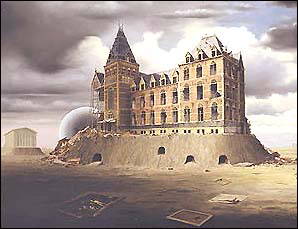
Will the Rijksmuseum weather the impending storms and bounce back to
its former glory, like a field of wheat in the wake of a rainstorm?
|
In the previous edition of "Weekly" I touched upon a debate on the impending
renovation of the Rijksmuseum, which is scheduled to take place on Tuesday,
6 February next at the Berlage Exchange building. The debate is being
organised by the Rijksmuseum itself and will be presided over by the
Netherlands' answer to Jeremy Paxman, Mr Adriaan van Dis.
Beware, however, for the Emancipated Citizen is on the warpath. That same day at Felix Meritis (the Shaffy Theatre to you and me), ARCAM will be staging an alternative debate. Clearly horns have been locked even though the decision as to who has been hired to wreck the Rijksmuseum has not yet been publicised. Before you read on, let me assure you that I'm finding it far from easy to write this. Doesn't it seem terribly inappropriate, even offensive, to come up with arguments aimed against openness and community involvement? Perhaps it would help to bear in mind that all certainty is by definition transient and it helps us stay alert to keep subjecting it to critical assessment. Let's assume for a moment that you are the Mayor of Amsterdam and you're wondering out loud whether your flock are at all interested in what your administrative machinery are thinking up on their behalf. This is nothing to do with the fact that civil servants merely act as if this is what they're doing whereas in actual fact they can hardly ever be accused of anything of the sort, but if all these emancipated citizens had come up with an alternative route (mind you, this is just for the sake of the argument), all this useless palaver of participatory rounds, informative evenings and committee hearings (from which the average citizen invariably returns with a feeling of having been severely diddled) could be done away with, which would save a heck of a lot of time and money. Of course the eventual answer to the question could turn out to be the opposite, but at least you'd know. Which would be helpful, or at least interesting, if you were the Mayor. Let's now assume that you are an imaginary citizen. You will at one time or other have graduated from high school and, with a bit of luck, also have a college education under your belt. Your walls are decorated with real works of art, and you feel strongly about the cultural fortunes of the City of Amsterdam. You know exactly what they should have made the Museum Meadow to look like. You agree that the City Hall cum Opera House is a monument to administrative failure, as are the Max Euweplein complex and the extension to the Van Gogh Museum. You are dead set against the construction of the subway. You donate money, you participate in debates, you sign petitions, you sue until you're blue in the face. The authorities, the city, the local administrators don't know what to do with you, having got to know (if not love) you as someone who can be relied upon to draw out anything that smacks of a policy decision into a veritable Unfinished Symphony. You'll continue manoeuvring your chess pieces until you have been vindicated. It may take you an age to get there, but never mind: even a stalemate against the bureaucratic behemoth gives you great satisfaction. Now you're once more in the Mayor's shoes. And although you keep stressing how much you appreciate the proactive involvement of the community, what you really feel is that the line should be drawn somewhere: as things stand, the very citizens at whose behest you go to such great lengths are effectively cooking your goose. However, you know better than to vent your spleen, for the press would have a field day if they ever caught you off guard. You'd be dead in the water, and that would be too high a price to pay. So what do you do? You appoint a committee instead. Now, dear reader, you are a participant in the aforementioned committee, which means that you've been landed right in it, for the press will roast you no matter what stance you adopt, so you might as well make the best of a bad situation and let rip. Anyway it is your duty in such a context to wrench your fellow citizens from this impasse, and in so far as you succeed with your comments in making the population and the administration sit up and take notice, this makes you a worthy person even though a whole bunch of experts will be champing at the bit to bring you down and give you the good old tar and feather treatment. Better still, you'll have provided the fourth estate with something to write about, which in itself is quite laudable. You decide to leak the following message: we should model ourselves on the art industry, where - allow me to close ranks just this once and use this personal pronoun - we all agree that the realisation of an art collection should most emphatically not be attempted through a committee, as experience has shown this to yield insipid compromises at best. Rather, it should be put together by a single person who is given the mandate, nay, strict assignment for a period of several years to do exactly as he or she jolly well pleases. No participation, no say in the matter, just go for the good old authoritarian and dictatorial approach. Using the same or another leak you proffer your views of the sociological aspect. Children have been shown to learn the most in peer group surroundings, and similar processes will take place later, when they've grown into adults. You drop words such as "subculture", "network", "peer group", "coterie", whatever, making it clear that the achievement of virtually all policy decisions relies to a greater or lesser degree on these mechanisms. You suggest redefining the notion of "debate" into that of a nostalgic event which symbolises the incredible amount of time it has taken for people to appreciate that the word democracy implies the realisation that it is only the chosen few who get to be involved in decision making in addition to which it is simply not possible always to explain how things are done, while the opportunity is nevertheless there that one could be involved in some decision making process or other and that one would then be most welcome to temporarily adopting a dictatorial stance, and that it is only for this reason that a degree of emancipation may be resorted to, and so on. And don't forget to let slip that according to you, a spot of soul-searching all 'round would be very much in order. Back to what brought all of this on: the Rijksmuseum debate. First let me venture as my view that it'd be pointless to participate. I'd characterise Cuypers' building as a closed structure which is architecturally pleasing from all four sides and which does not feature any room for additions (unlike the Louvre, where the vast space between the two wings now houses the glass pyramid) or subservient side walls (unlike the Amsterdam Concert Hall) justifying extension. Second, in addition to the many pros and cons which are guaranteed to be tabled, I'd like to repeat Theo Voorzaat's view: leave buildings, especially old ones, alone, for natural decay is a most glorious process in itself. Third, whoever the architect that is selected, let's leave him to it (funny, that: not a single lady candidate in sight, and yet I recently read somewhere that the spatial insight of women during their period is vastly superior to that of men) - no litigation, no lawsuits on the merit of the case, no referendums, just quiet observation without resorting to force. And fourth, the City Hall cum Opera House is bound before too long to be diagnosed as suffering from concrete decay, so it too will require renovation. If you feel you should be allowed to stick your oar in, you'd be well-advised to launch your machinations right now. 
|
BACK